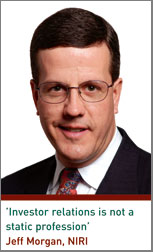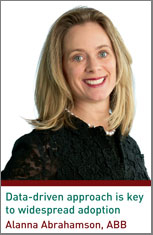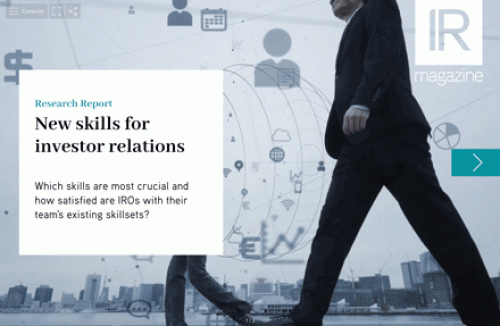The US IR association has grand plans to develop a global set of IR standards, but is it really possible?
Even before the global recession and the euro crisis rudely rammed the point home, it had long been obvious that financial markets are interlinked.
As the accounting standardization effort to meld GAAP and IFRS creeps forward, not only the language but also the syntax of global business and finance are aligning.
While culture, language, customs, time zones, market structure and regulatory schemes may differ, if the financial markets are truly global, it follows that IR best practices should be global as well, right? NIRI CEO Jeff Morgan will put that proposition to the test as the institute implements its vision to build a ‘more inclusive, networked, global organization’ over the next three years, in part by positioning NIRI ‘as the global benchmark for IR practice’.
NIRI CEO Jeff Morgan will put that proposition to the test as the institute implements its vision to build a ‘more inclusive, networked, global organization’ over the next three years, in part by positioning NIRI ‘as the global benchmark for IR practice’.
Last year, during deliberations over NIRI’s three-year strategic plan, Morgan started a broad discussion about how the organization could be a bigger help to the profession not just in the US, but also around the globe. ‘This is something I am a strong believer in,’ he says.
Citing the recent global recession that affected companies in all markets, Morgan adds that ‘it’s very important for the IR profession to look outside of national borders, to look at the market as a whole.’ Given everything that had gone on over the previous three years, this was not a hard sell to the board, he recalls.
Guarded approval
The plan has received a cautious welcome from some IROs, a number of whom point out that they favor the creation of high-level guidelines over anything too proscriptive. There were also warnings, however, about an overly standardized approach and the creation of rules based simply on what works for US companies.
As the largest IR professional association in the largest financial market, NIRI has a natural role to play in promoting best practice, Morgan argues. He adds that transparency and disclosure are core elements of ‘what we do as investor relations professionals.’
But NIRI’s CEO is not suggesting that the organization develop a set of global standards to be delivered to the world from on high.
Morgan doesn’t see NIRI in competition with other IR societies around the globe, and he acknowledges that each local or regional organization is better equipped to keep on top of different regulations and to understand the local culture in its own capital market.
Instead, he envisions an open-source approach – a WikiBase of IR standards of practice – built around comment and input from the global investor relations community.
What’s more, NIRI has the infrastructure and resources to host such a platform, Morgan says, and because the NIRI name and reputation carry value outside the US, hosting an open-source platform is a natural step.
In the past, NIRI developed and published standards of practice that would be revised every two or three years – too long a lag time for the fast-moving environment in which IROs operate today, Morgan argues. ‘Investor relations is not a static profession,’ he says.
‘The practice is evolving quickly because the world around us is evolving.’ Whether it’s shifting capital market structures, new communications methods, high-speed trading technologies or the 24/7 global market environment, Morgan says the IR profession must be constantly receptive to change.
He admits that a lack of consistency in regulatory regimes can result in some wide disconnects, and that behavior acceptable in one market – such as sharing and trading on inside information – are prohibited in others.
But he argues that globalization of markets will increase investor demands for greater consistency in behavior across markets, and consistency of certain IR standards of practice.
‘We’re in stage one’ he says. ‘Our initial focus is to move standard setting into this open-source model.’ He admits he has not yet spoken to his counterparts in other IR associations, but says he will be meeting with them later this year to kick off the effort.
Some implementation steps still have to be thought through, as well. For example, when asked whether vendors, consultants or market players who are not members of one or another of the professional associations would be able to provide input, Morgan says ‘probably not’ but admits that the topic hasn’t been discussed by the board.
He views the development of a truly global IR standard-setting body as being a long way off. ‘As our financial markets develop, that might be a very good thing,’ he says. ‘But we’re in the first half-inning.’
Points of view
IROs and professional associations around the globe contacted by IR magazine were not familiar with the NIRI project and, consequently, most were reluctant to comment.
A few IR professionals did offer their thoughts about what a global investor relations standard might look like, however, and also gave their opinion on some of the challenges Morgan and NIRI may face in meeting their lofty objective.
John Dawson, director of IR at National Grid and chairman of the UK-based IR Society, acknowledges that differences in company law and approach create some practical challenges to establishing a global set of standards, but he views movement toward a global approach positively. IROs across borders share ‘the fundamental ingredients of professional IR behavior and skills’, he says.
Doug Menelly, who worked as an IRO in China for NYSE-listed electronics manufacturer SinoHub, cautions that a standard-setting effort spearheaded by a US organization might be perceived as trying to develop rules globally ‘based upon what works best in the US’.
He says ‘guidelines’ and ‘best practices’ would be more acceptable than ‘standards’, as long as NIRI allows time for feedback and input and takes local customs and culture into account.
At the same time, Menelly adds that there is strong demand for executive education in ‘many problematic US-listed Chinese firms’ on subjects like IR, GAAP and IFRS accounting, corporate governance, ethics, transparency and communications. Alanna Abrahamson, US-based IRO for Swiss industrial giant ABB, argues that a data-driven approach will be key to widespread adoption of any recommended best practices.
Alanna Abrahamson, US-based IRO for Swiss industrial giant ABB, argues that a data-driven approach will be key to widespread adoption of any recommended best practices.
Abrahamson points out that convincing a CEO or CFO to change to a recommended new disclosure practice, for instance, will be much easier if the IRO can point to a survey demonstrating the prevalence of the new approach among peer companies, rather than relying on a compilation of recommendations from other IROs.
Flexible approach
Patrick Kiss, IRO at Deutsche EuroShop, is skeptical. He thinks IROs would push back against too much standardization if it felt like a ‘plain vanilla’ approach to IR. He wants to leave ample room for creativity ‘within the rules and legal requirements’.
But the Hamburg-based IRO sees value in ‘best practice recommendations as a dynamic document that changes constantly’ – pretty much what NIRI has proposed. He also thinks it will be several years, ‘maybe not until 2020’, before a set of global best practices emerges.
Oliver Schutzmann, IRO at Dubai-based Shuaa Capital, confesses that developing global IR standards is ‘very close to my heart’.
Arriving from Germany, where he’d worked in the capital markets and as an IR consultant, Schutzmann helped start the Middle East Investor Relations Society in 2008.
The association draws its 100 member companies from regions across the Middle East, including Dubai, Saudi Arabia, Qatar, Kuwait, Palestine and Egypt.
Following the introduction of an IR certification program, investor relations in the region ‘has really come a long way’, observes Schutzmann. He sees limits to a more global approach, however, and feels official best practices should be restricted to general guidelines around topics such as the need for transparency and how to deal with analysts. ‘It’s a mammoth project,’ he says.
‘My personal view is that it’s not possible unless it’s limited to a very generic high level.’










